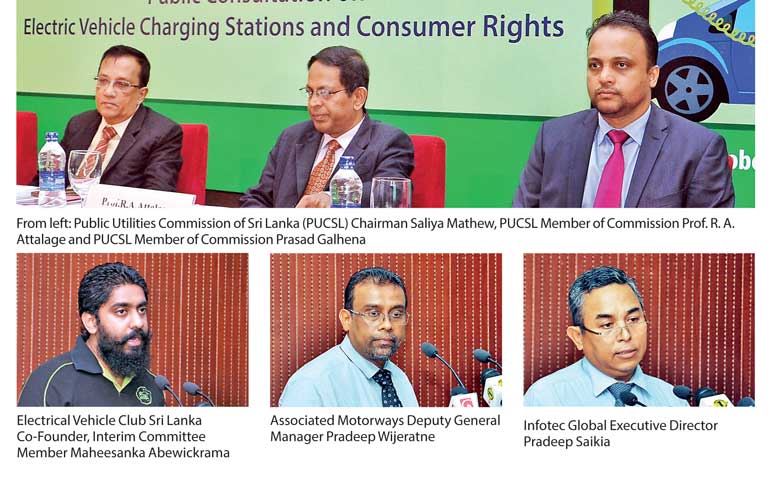Tuesday Feb 24, 2026
Tuesday Feb 24, 2026
Friday, 20 October 2017 00:00 - - {{hitsCtrl.values.hits}}

By Charumini de Silva
Stakeholders of electric vehicles in the country called for systems and protocols to be open and standardised in the upcoming regulatory framework for electric vehicle charging stations (EVCS), consumer rights and related areas which will be in effect from the middle of next year.
Automobile companies, consumer associations, investors, industrialists and other individuals yesterday presented their views, comments and proposals at the second phase of the public consultation on the regulation of the EVCS and the protection of consumer rights conducted by the Public Utilities Commission of Sri Lanka (PUCSL).
Improper billing methods, the unavailability of real-time information, registering for authorised EVCS, standard selling prices, accountability or insurance for EVs while charging, standard signboards, standard work hours, battery and disposal as well as concerns in sales of grey market EVs in Sri Lanka were highlighted as major constrains which need to be addressed in the regulatory framework.
Electrical Vehicle Club of Sri Lanka Co-Founder and Interim Committee Member Maheesanka Abewickrama said the authorities need to prioritise what they intend to do with EVs in the country.
“We need to focus on what the regulatory framework intends to do. Is it to encourage use for primary transport, allow to use it as a secondary or leisure or to reduce fuel usage to EVs?” he questioned.
According to him, 73% of people use EVs for individual use and 93% are very satisfied customers who are willing to upgrade for another EV.
Sharing consumer views on charging stations, he highlighted improper billing methods, no standards in selling prices, no alternative charging methods (at least 15A power outlet) provided at stations and high prices for Level 2 (L2) charging as key concerns that need to be addressed.
In terms of end user tariff and billing, Abewickrama asserted it was important to define selling rates for DC fast charging stations and L2 charging station based on time of use.
«As consumers we like to have kilowatt hour (KWh) based billing, but it is alright to add time-based price (per minute charge or for time slots) on top of KWh price in order to manage long duration charging,» he added.
Further, he pointed out introducing selling rates for each existing tariff category.»This is very important as some other businesses like to provide this as an additional service such as hotels, restaurants, super markets and apartments.
However, Abewickrama urged avoiding the sale of electricity at high prices for electric vehicles noting that some places practise priced Rs. 70/KWh for providing only a 15A power socket.
It was pointed out that there are 350 registered members in the Electrical Vehicle Club of Sri Lanka.
Noting that EV batteries contain toxic chemicals and if not disposed of in the correct manner can cause contamination and lead to environmental damage, Associated Motorways Deputy General Manager – Nissan, Pradeep Wijerathne, recommended batteries be disposed of according to manufacture guidelines by authorised service dealers.
He also said raised concerns over sales of grey market EVs in Sri Lanka. “As the lifespan of the EV battery is approximately eight years (depending on the usage), we suggest to have limitations in vehicles imported to the country to be not more than six months old from the date of manufacture.”
Wijerathne emphasised having an insurance scheme in place at EVCS for consumers in case any damage was caused due to charging.
Expressing views from a supplier’s perspective, Infotec Global Executive Director Pradeep Saikia stated it was imperative to maintain a register of authorised EVCS at the Ceylon Electricity Board (CEB) and Lanka Electricity Company Ltd. (LECO).
“This will enable regulatory authorities to ensure that service providers meet consumer requirements in terms of the quality of installation, information systems and support structure. In China, the Government requires all charging stations to be connected to a backend system monitored by China Grid. It allows monitoring the availability, security and performances of the different EVCSs,” he added.
He said the interests of consumer and investors on the infrastructure with a level playing field was important as well as a reasonable return on investment (ROI).
Saikia noted that a well-regulated and widespread network of fast chargers was critical for the transition of the EV from second or third vehicle status to becoming the primary vehicle of use.
The growth of EV share in total car sales is directly influenced by the incentives and policies extended for the purchase and operation of the EV, he expressed, calling for consistent regulations to make a definitive impact on the promotion and adoption of new energy vehicles for all transportation needs.
- Pix by Ruwan Walpola